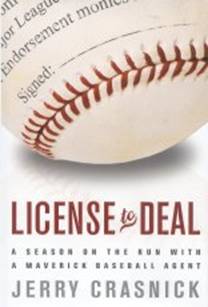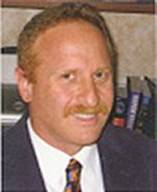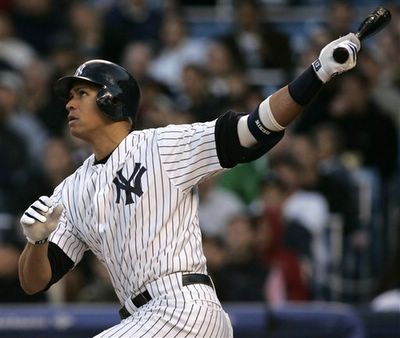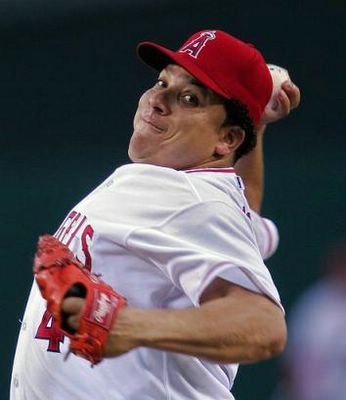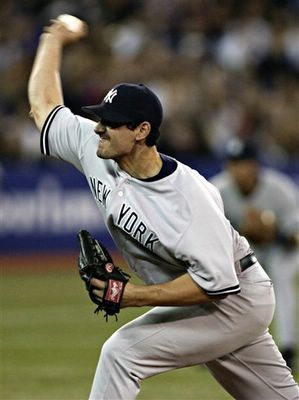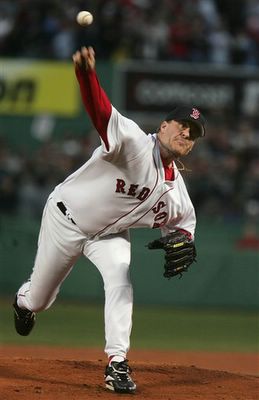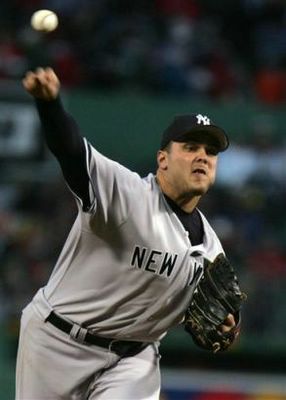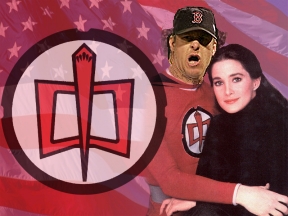It's interesting to see teams making moves this early in the season, right at the All-Star break, instead of waiting until the trading deadline or later. Boston's needed bullpen help for some time now, and Chad Bradford is just that. He hasn't yet pitched in the majors this season due to a back injury, but he has established himself as an effective middle reliever for the last several years in Oakland. His sinker should help keep the ball on the ground in Boston, which is necessary for any pitcher's success in such a small park.
On the other hand, why Oakland would want Jay Payton is beyond me. He's a decent defensive outfielder, but is below average in every offensive category, having neither the patience nor the power that Oakland GM Billy Beane supposedly values so highly. Oakland is 14th in the majors in run-scoring, despite hitting the fourth fewest homers of the 30 MLB teams. They are 8th in on-base percentage, so maybe Beane knows what he's doing.
And by extension, maybe he also knows what he's doing by trading OF Eric Byrnes and cash to the Rockies for LHP Joe Kennedy and RHP Jay Witasick. Byrnes is 29 and is in his sixth season in the majors, though he has only been a regular for the last few of them. He'll either be a free agent or at least elligible for arbitration at the end of the year, and therefore expensive in either case, a luxury the Oakland franchise cannot afford.
Beane has built his team by finding reasonably inexpensive talent through the draft and through minor league free agency, keeping players through the portions of their careers during which they're both good and cheap, and preferrinf to let someone else pay them the big bucks afterwards, even if they may be better once they leave Oakland. Terrence Long, Ramon Hernandez, Jason Giambi, Cory Lidle, Jason Isringhausen, the list is almost endless. But the proof is in the pudding as the A's have had six-straight winning seasons with the Moneyball formula, including four trips to the playoffs.
Another possible reason for trading Byrnes, though Oakland would never admit this, is the possibility that he'll get injured. ESPN's baseball analysts were handing out their defensive awards for the first half of the season last night (slow sports news day, you know) and Peter Gammons' pick was Eric Byrnes, whom he called "The Crash-Test Dummy" because he plays defense with such abandon, running and diving for balls, crashig into walls, teammates, moving automobiles, etc. just to make a catch. It's a great and creative nickname, something today's game tends to lack, but it's also a recipe for disaster.
Historically, one of the better known individuals with such tendency was Brooklyn Dodgers outfielder Pete Reiser, who had a reputation for crashing into walls and other non-malleable objects as well. Reiser's enthusiasm and acrobatics made him a fan favorite, like Byrnes, though he was a better player than Byrnes is. He finished second in the NL MVP voting in 1941, sixth in 1942 and 9th in 1946, even after he missed the '43-'45 seasons serving in the military. He had hit .306 while scoring 400 runs, driving in 298 and stealing 78 bases during the six years Brooklyn had him, but after being traded straight-up to the Boston Braves for a backup outfielder named Mike McCormick, Reiser never saw 260 plate appearances in a season again, and hit only .248, stealing only 9 bases over parts of four seasons with three different clubs throughout his career.
Not that Byrnes is necessarily doomed to the same fate. Theoretically, Byrnes should be helped offensively by Coors Field, as nearly every hitter is. He's got 20-homer, 20 steal potential in Oakland, a pitcher's park. The thin Colorado air should help to improve his strikeout-to-walk ratio and help to turn some of those doubles into home runs, making him more valuable in fantasy leagues, if not in an actual one. However, the large expanses in the Colorado outfield will mean that Byrnes will have even more area to cover, and potentially more chance to dislocate, oh say, a shoulder while diving for a batted ball and crashing into Cory Sullivan and/or a Volkswagen.
One player whose offensive numbers will not be helped by his recent trade is Preston Wilson, swapped with some cash for pitcher Zach Day, OF J.J. Davis and a minor leaguer. Wilson led the NL with 141 RBI in 2003, but his adjusted OPS was only 15% better than the league for that year, and his 36 homers and that truckload of RBIs had more to do with Colorado than with his talent. Furthermore, Wilson's gimpy knees and $12.5 million salary seem to have aided in wearing out his welcome even more than his .258 batting average and propensity to strike out 140 times per season.
Furthermore, being traded to a team that plays half its games at sea-level will not help him to land another big contract. Take a look at Wilson's career stats at Coors Field and elsewhere:
Career AVG OBP SLG
Coors .279 .347 .528
Else .261 .324 .469
The biggest difference, of course, is the slugging percentage, but those batting average and OBP variations are nothing to ignore either. More importantly, the differences since Wilson joined the Rockies are even more stark:
2003-05 AVG OBP SLG
Coors .288 .350 .544
Else .248 .306 .445
Rob Neyer once suggested that a hitter being traded to the Rockies, and therefore playing half his games in Coors Field, may not be entirely unlike the evolution of the polar bear, if you believe in that sort of thing. (Personally, I'm not yet sold on the theory, as I've never actually seen a "polar bear".) Presumably, polar bears went through numerous mutations over millions of years until they had developed traits (white fur, thick layers of fat, an affinity for Coca-Cola, etc.) that made them particularly adept at surviving in the harsh Arctic climate. Conversely, polar bears do not do well in any other climate, as their fur provides no natural camoflauge in other settings, their fat makes them too hot south of the Arctic Circle, and Coke isn't nearly as readily available in other places.
Similarly, hitters learn to hit very well in the thin air of Denver, as curveballs break less, sinkers sink less and batted balls travel farther than they do at sea level. But when the Rockies go on the road, those pitches are harder to hit because they break normally, and even the balls they do hit don't go as far with the same force imparted to them. This gives the Rockies an especially tough time adjusting when they go on the road, as no road trip is usually long enough to allow them to recover from "air-lag", if you will. Once getting traded away from Colorado or leaving via free agency, most players lose much of their hitting prowess at home but recover some of what they lacked on the road, winding up with lower stats than their overall numbers as a Rockie, but not as low as their away-from-Coors numbers had been during the stint in Colorado. Larry Walker, for example, had hit only .227 on the road in 2003, his last full season with Colorado, but hit about .280 with St. Louis last year and is hitting .269 this season.
Other players, such as the aforementioned Jay Payton and Vinny Castilla, completely fall apart upon leaving Colorado. Castilla has done it twice now. The first time he left Colorado, he hit about .220 in parts of two seasons with the Devil Rays, with no power and even less health, as it turned out, after averaging better than .300 with 30 homers and 100 RBI for four straight years in a Rockies uniform. Last year, back in Colorado, he slugged .535 and led the NL with 131 RBI, but again left, and has seen his numbers dwindle to .253 with a .397 slugging percentage. At this pace, he won't even hit 12 homers for the season. Bret Boone has more homers than Castilla, and his team just released him.
All of that is a long-winded way of saying that if you have Preston Wilson on your fantasy team, get rid of him now. Not only is he leaving the best hitting environment in the history of major league baseball, he may be going to one of the worst. Washington has scored the fewest runs and hit the fewest homers of any other team in MLB in 2005. They're tied for dead last in the majors in both runs and homers at home, but are pretty bad at scoring runs on the road as well, ranking 22nd of 30. Jose Guillen is having a fine season, worthy of his All-Star selection, with 18 homers and a .305 average, but he's hit only one of those 18 homers in Washington. One. Nobody else on the team has more than Nick Johnson's eight, and he's currently (surprise!) on the DL.
What you may not know is that Washington's pitching staff has also allowed fewer homers than any team in MLB, including an especially stingy 19 at home. (For reference, the next closest team is Boston, with 26, and they've played five fewer home games than the Nats.) On the road, the Nationals are just average at preventing homers, having surrendered 48 of them, for a #16 ranking out of 30 teams. Not surprisingly, they're 20th in road ERA, while easily ranking first at home, two-tenths of a run better than Houston at #2.
I don't know exactly how park factors are calculated, but I'm sure that if this trend continues, RFK Stadium could go down as one of the worst hitter's parks in history, at least for one year. And Washington should further deflate Wilson's already Coors-inflated statistics, making him look even worse to potential off-season buyers.
What the Nationals really needed to boost the offense, I mean besides Harmon Killebrew in his prime, is someone whose apparent offensive prowess was not a creation of his home park. Someone like Ken Griffey, for example, who's been a good hitter in almost every environment for over 15 years, has only one more year on his contract and is already rumored to be on the trading block. Griffey would have been a better fit, especially since he's actually making less money than Wilson, a difference of over $2 million for the season, about half of which is still due to be paid.
Of course, having Griffey and Nick Johnson on the same roster probably is not a good idea. I doubt its ever happened before, but if anyone can figure out how to get a centerfielder and a firstbaseman to collide on a play, causing both players to sustain season-ending injuruies, these two would figure it out. So forget I mentioned it.



